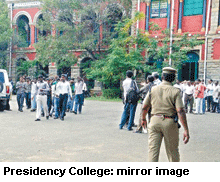As though a spate of reports about continuously falling standards and rising numbers of unemployable graduates aren’t bad enough, a wave of student violence is washing over institutions of higher education in the southern seaboard state of Tamil Nadu (pop. 72 million). In particular, the campuses of government colleges in the state are fast transforming into war zones in which rival groups of students brutally target each other with deadly weapons.
 A violent clash between two groups of students in Chennai’s reputed Presidency College (the first government college to be established in Tamil Nadu in 1857) on January 2, has shocked the public and exposed the indiscipline and lawlessness prevalent on college campuses in the state which prides itself on its fine academic traditions. Despite a police team being posted outside the college gates following an attack on a student last December, a group of students armed with sickles, tube lights and sticks chased and attacked two students.
A violent clash between two groups of students in Chennai’s reputed Presidency College (the first government college to be established in Tamil Nadu in 1857) on January 2, has shocked the public and exposed the indiscipline and lawlessness prevalent on college campuses in the state which prides itself on its fine academic traditions. Despite a police team being posted outside the college gates following an attack on a student last December, a group of students armed with sickles, tube lights and sticks chased and attacked two students.
The proximate cause of the violence in Presidency College, which hosts 4,000 students mainly from underprivileged and backward classes mentored by 244 faculty, is childish rivalry between student groups travelling on different Madras Transport Corporation (MTC) bus routes to and from the college. In this instance, students travelling by the 6D bus route constitute a majority group and are more popular than those travelling by the 27H route. However, during recent college union elections, 27H bus route students allied with students from other routes and emerged victorious thus enraging the losing group. A verbal spat between the groups escalated into a violent clash.
Yet a deeper cause of campus violence is caste animosities in the state’s 69 government arts and science, and seven law colleges which predominantly admit students of backward classes/castes, divided inter se by caste and political affiliations in a society in which politics is heavily influenced by caste factors. The brutal caste clashes between student groups of Chennai’s Dr. Ambedkar Government Law College on November 12, 2008, which shocked the nation, is a case in point. At the time, the police remained mute spectators to full-blown violence, giving rise to the suspicion that their hands were tied by the political-powers-that-be.
“In Chennai, student gangs are formed based on caste-cum-political affiliations and bus routes, and are heavily involved in student union elections with gang leaders getting full support from one or more political parties. Students run riot because college principals don’t take stern action against them. The absence of effective leadership is the root cause of all the problems of govern-ment colleges,” says D. Victor, former director of collegiate education and currently director of the Academy for Quality and Excellence in Higher Education, Chennai.
Most academics blame the state government for recurring campus violence. According to them, many government arts and science colleges are rudderless, without principals and with huge teacher vacancies. In Presidency College, for instance, a senior faculty member has been principal-in-charge since 2008 and there are ten lecturer vacancies. Moreover, the indifferent attitude of government college manage-ments, lack of a structured curriculum and extra-curricular activities have led to students with time on their hands indulging in violent behaviour.
“Most students of government colleges are first generation learners from socially and economically backward households with unsupportive home environments and minimal values. And with neither students nor college managements accountable for indis-cipline on campus, they run wild. They also get free education, free bus passes, scholarships to the tune of Rs.1,700 per year in addition to which Tamil-medium students are eligible for a special stipend of Rs.200 per term. With everything available free of charge in government arts, science and commerce colleges, few attach any value to college education,” says B. Ramananthan, former principal of Presidency College, who retired in 2008.
In sharp contrast, private colleges seldom experience such anarchy. Students pay market-led tuition fees and focus on getting value for money. Moreover, private colleges have to maintain their reputation and severely penalise student misbehaviour.
Clearly, permissive government colleges in Tamil Nadu have become breeding grounds for hooliganism and require stringent administrative and academic reforms. But with pernicious caste consciousness deeply entrenched in this once progressive state, college campuses have become a mirror image reflecting the deep animosities of political parties and chaos in the state legislative assembly. Politicians who can’t — or won’t — reform themselves are unlikely to appreciate the need to clean up the augean stables of government colleges.
Hemalatha Raghupathi (Chennai)